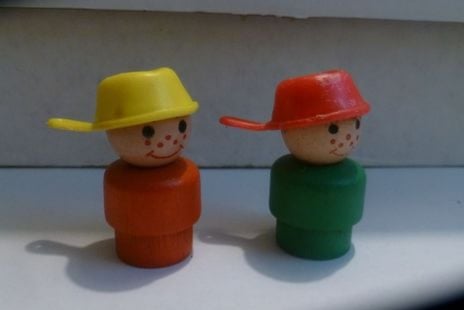Genetically engineered pets
Printed From: Progarchives.com
Category: Topics not related to music
Forum Name: I Have A Question For You......?
Forum Description: Ask any question on any subject: if the admin team or any of our members can answer it we will.
URL: http://www.progarchives.com/forum/forum_posts.asp?TID=92046
Printed Date: December 02 2024 at 03:40
Software Version: Web Wiz Forums 11.01 - http://www.webwizforums.com
Topic: Genetically engineered pets
Posted By: Gerinski
Subject: Genetically engineered pets
Date Posted: February 14 2013 at 13:46
|
Here goes the second question: With the advances of genetic knowledge and engineering techniques I guess that it is now conceivable to try to engineer a 'perfect pet', some animal which would be soft, hairy, conveniently sized, sweet, loyal, resistant to major diseases etc, imagine being able to have a sort of small non-aggressive lion as pet, or a playful, active and sweet sort of Koala or things like that. There could be a huge business awaiting there, a genetically engineered 'perfect pet animal'. We wondered how come big corporations are not investing in this idea. Do you think this is feasible? If it's not yet, there's no doubt that it will be eventually. What are your thoughts about the idea? Are there laws preventing genetic engineering research in this direction? Should there be? What would be your personal stance if such a genetically engineered 'perfect pet' would be marketed? |
Replies:
Posted By: Marty McFly
Date Posted: February 14 2013 at 14:26
|
Gerard, as I am (very slowly, but still) getting older and knowing more and more, I realized that there are some questions, which are nearly impossible to answer correctly. Genetics is one of them. Electronic augmentation of human body is another of them, virtual reality and its abusing is another. Nuclear weapons in hands of some irresponsible fanatics with no regard for human life... I would of course like to discuss all these issues and give my 2 cents, but to answer your question specifically - the current way our civilization is going heads there. We're not there yet, but we will be one day. 5, 10 or 40 years, but we will. Certain cat/dog breeds are something like primitive state of such concept, they were carefully selected, raised ... bred over the years so now we have so many (especially) dog breeds. + combinations of breeds as well, so we get so many variations. Take for example lions of panthers - variations there are not so big, but you get cats of so many colours, shapes, body builds etc. That's proto, now for the future. Perfect pet ? :-D It will be here, I do not like it, yet I am unable to do anything about it. I'm not against it so strong anyway, I would just stick to the old dog/cat combination I am used to. I am used to, do you see this phrase ? Because that's me, but what about new generations of kids who will grew up in a world where such genetically perfect pets will be normal ? You know the answer. ------------- There's a point where "avant-garde" and "experimental" becomes "terrible" and "pointless," -Andyman1125 on Lulu  Even my |
Posted By: HolyMoly
Date Posted: February 14 2013 at 14:38
|
My own layman's guess is that it can be done, but any significant changes to animals' DNA would probably need to be executed gradually over many generations, in order to keep the transition as natural as possible. Otherwise we might be overrun with HALF CAT HALF STAPLER monsters just because one scientist had a bad day.
------------- My other avatar is a Porsche It is easier for a camel to pass through the eye of a needle if it is lightly greased. -Kehlog Albran |
Posted By: HolyMoly
Date Posted: February 14 2013 at 14:45
|
As for my personal stance on it, I think it's fine, if it's done responsibly, safely, and humanely. That's a big "if" though. My fear is that people will exploit it for profit, which is what usually happens.
------------- My other avatar is a Porsche It is easier for a camel to pass through the eye of a needle if it is lightly greased. -Kehlog Albran |
Posted By: The Doctor
Date Posted: February 14 2013 at 14:58
|
Could they make well-behaved cats? ------------- I can understand your anger at me, but what did the horse I rode in on ever do to you? |
Posted By: Marty McFly
Date Posted: February 14 2013 at 15:19
|
Hehe, would so many people smoke weed if it was illegal ? Would people love cats so much if they behaved better ? Not sure on either, but part of what makes cat so popular is it's dependent independent behavior, it's self-consciousness. ------------- There's a point where "avant-garde" and "experimental" becomes "terrible" and "pointless," -Andyman1125 on Lulu  Even my |
Posted By: Dean
Date Posted: February 14 2013 at 15:28
|
All modern domestic animals are generically engineered creatures, many bear little resemblence to their wild ancestors. Whether you do it through selective breading or genesplicing the net result is the same - we engineer wild animals to be docile and loyal and have specific traits that we find atracctive or useful. ------------- What? |
Posted By: Gerinski
Date Posted: February 14 2013 at 15:29
Well, generations on most pet-like animals are not long so that would not be a big problem.
|
Posted By: Gerinski
Date Posted: February 14 2013 at 15:32
Yes sure, what I meant is, genetic engineering seems to be a faster path given current technology, isn't it strange that big corporations aren't investing in this potential business?
|
Posted By: Dean
Date Posted: February 14 2013 at 16:16
Also, while pet provisions (food, pharmaceuticals, etc) is a mult-billion dollar multi-national industry pet supply is essentially a localised cottage industry by comparison - the value of the market is too small for big corporations. We don't have huge factory farms knocking out production lines of Tibbles™ the Kat and Fido™ the Dawg - pets are supplied by lots of small specialist breeders in incredible small numbers because pets are not a consumable. In fact domestic pets like cats, dogs, mice, rabbits, goldfish etc. are such prolific little buggers they tend to multiply without too much encouragement so many people don't even obtain them from these small-scale specialist breeders but from other owners' whose moggy spent the night out on the tiles one balmy evening in June and now has a litter of kittens that are "free to a good home". With that kind of infrastructure the big boys don't stand a chance of competing. ------------- What? |
Posted By: The Doctor
Date Posted: February 14 2013 at 16:20
I don't really see a problem with a half-cat half-stapler. Suppose you're petting your cat and suddenly find yourself needing to staple some paperwork together. This could solve that problem easily. In fact, I'd also like to see half-cat/half-dishwasher, half-cat/half-word processor, half-cat/half-tax preparation software. Think of the applications. ------------- I can understand your anger at me, but what did the horse I rode in on ever do to you? |
Posted By: Dean
Date Posted: February 14 2013 at 16:32
------------- What? |
Posted By: The Doctor
Date Posted: February 14 2013 at 16:37
|
------------- I can understand your anger at me, but what did the horse I rode in on ever do to you? |
Posted By: Ajay
Date Posted: February 15 2013 at 01:09
|
Holy oboes & xylophones! http://www.genpets.com/index.php" rel="nofollow - http://www.genpets.com/index.php |
Posted By: darkshade
Date Posted: February 15 2013 at 01:44
|
If we're going to genetically alter animals, maybe we should test it on..... humans. You know, kind of like reverse.
------------- http://www.last.fm/user/MysticBoogy" rel="nofollow - My Last.fm 
|
Posted By: Man With Hat
Date Posted: February 15 2013 at 03:02
|
If they could get my pet gorilla to make balloon animals and solve these differential equations my life would be much easier. Also, this is an interesting concept. Some of which I'm sure I agree with. ------------- Dig me...But don't...Bury me I'm running still, I shall until, one day, I hope that I'll arrive Warning: Listening to jazz excessively can cause a laxative effect. |
Posted By: HolyMoly
Date Posted: February 15 2013 at 06:35
|
I am pleased that you all ran with my cat/stapler concept. I just wrote it off the cuff, but then it had me thinking about it for the rest of the day. ------------- My other avatar is a Porsche It is easier for a camel to pass through the eye of a needle if it is lightly greased. -Kehlog Albran |
Posted By: Gerinski
Date Posted: February 15 2013 at 06:49
|
Only indirectly related to the question but I found these: 1. Company that claims that they will clone your pet dog so you can 'have it again' after it died. http://myfriendagain.com/default.htm" rel="nofollow - http://myfriendagain.com/default.htm 2. Cross-breeding experimentation in cows / bulls led to these anomalous breeds where the gene that controls muscle growth was suppressed, resulting in these 'double-muscle' animals, despite the apparent benefit of producing more meat, due to several issues they have not been clearly proven to be more economically efficient. All in all bit scary, the Island Of Doctor Moreau  http://www.hemmy.net/2007/07/16/belgian-blue-cattle-super-cow-aka-incredible-hulk-cow/" rel="nofollow - http://www.hemmy.net/2007/07/16/belgian-blue-cattle-super-cow-aka-incredible-hulk-cow/  |
Posted By: Gerinski
Date Posted: February 15 2013 at 10:39
A funny case which brings another important question: How much can /should we trust the internet? Believe it or not , my sister is a biochemist and her husband is the dean of Barcelona biochemistry university, so they are both obviously smart people and more than familiar with genetic engineering, and yet even she was fooled for a very short time when the Genpets stuff came out years ago. Just as another trivial example concerning a far less important subject, during my recent research about music instruments for my blog article, some sources said that Roland cooperated with Ibanez to build the G-303 guitar synthesizer instrument, while other sources deny this. Who's right? In the modern internet world anybody can publish what they want or believe. How can we tell what is objectively true or is not? |
Posted By: Dean
Date Posted: February 15 2013 at 10:51
I believe that it was the parent company of Ibanez (Hoshino Musical Instruments) who Roland collaborated with on the G303 and they were manufactured by FujiGen Gakki (Fuji Stringed Musical Instruments) ... who also manufactured for Ibanez, Fender, Yamaha, Epiphone and Gibson guitars. Which would explain why some sources believe Ibanez were involved and some do not. Essentially to make a playable guitar that could be taken seriously Roland had to get expertise from someone else and it would be more natural for them to approach a Japanese manufacturer than an American one for such a partnership. ------------- What? |
Posted By: Icarium
Date Posted: February 15 2013 at 10:58
|
lookn at the breaded race horse, its so in breaded and so full of injected testosteron and storides that it is dangerous to eat them, hence the now very emberrasing horse meat in lasagna scandal in Europe
-------------  
|
Posted By: Dean
Date Posted: February 15 2013 at 11:06
|
The reality is already here:
http://glofish.com/images/glofish_037.jpg" rel="nofollow">
 GloFish® http://www.glofish.com/" rel="nofollow - http://www.glofish.com/
------------- What? |
Posted By: Barbu
Date Posted: February 15 2013 at 11:53
|
Doctor, Doctor, what is wrong with me?
This supermarket life is getting long... ------------- |
Posted By: Failcore
Date Posted: February 15 2013 at 16:08
|
I tend to oppose this kind of stuff just because Mother Nature is such a complex system that the blowback is impossible to predict. There's a potential to destroy entire ecosystems if a scientist puts an A C T or G in a wrong place. It probably would go just fine to genetically engineer pets. But on the off chance something wonky and unforeseeable happens, like the genetic cat's improved immune system causing a rapid adaptation/mutation in bordatella which then jumps the species barrier to humanity and kills half the planet, it could be bad. Obviously an exaggeration, but the potential exists for some weird crap to go down if we start down the Eugenics path, even if limited only to animals. Heck just look at the transgenics stuff going on where the retroviruses used to engineer crops are getting into fauna that interact with those crops, also altering their DNA. ------------- 
|
Posted By: Ajay
Date Posted: February 16 2013 at 00:59
How? DNA mismatches during replication and recombination have been happening for as long as there's been DNA. Organisms have a DNA mismatch repair system which repairs these errors. When that system fails, the result is cancer, not a genetic epidemic. Here as elsewhere, most mutations are not viable.
Eugenics is the science of improving humans by the application of selective breeding, which is how humans have been improving plants and livestock for thousands of years. Selective breeding leads to monocultures, which, through a lack of genetic diversity in their makeup, are more susceptible to being wiped out by bacteria. The products of selective breeding, therefore, tend to be wiped out by other organisms, not the other way around. |
Posted By: Tapfret
Date Posted: February 16 2013 at 03:05
Yes! I can finally have this! ------------- https://www.last.fm/user/Tapfret" rel="nofollow">  https://bandcamp.com/tapfret" rel="nofollow - Bandcamp |
Posted By: Gerinski
Date Posted: February 17 2013 at 07:19
As long as you keep a large enough population to ensure a diverse enough gene pool, and take care that mating happens among members of different strains, you can still breed towards an 'eugenic' target without compromising too much the vulnerability of the species, that's what good breeders do. An associated but different problem however is that breeded species populations tend to be overprotected from their natural predators, bacterial infections, parasites and other diseases, so gradually they loose the features which protected them from these threats, making them vulnerable, but the cause is not selective breeding itself but overprotection. You can do selective breeding aimed at being more resistant, more successful at defeating predators etc, it's just that that's not what is usually done.
|
 HolyMoly wrote:
HolyMoly wrote: